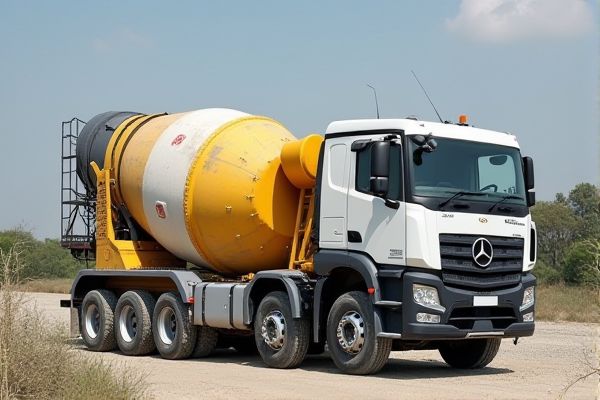
India's cement industry is dominated by brands such as UltraTech Cement, Ambuja Cements, and ACC Limited. UltraTech Cement, a subsidiary of Aditya Birla Group, has a strong market presence with numerous manufacturing plants across the country. Ambuja Cements focuses on sustainability and innovation, offering a range of products tailored for various construction needs. ACC Limited is known for its high-quality cement and commitment to environmental practices. You might consider these brands for construction projects or building needs in India.
Brands to consider
UltraTech Cement
UltraTech Cement offers a wide range of high-quality cement products suitable for various construction needs in India. Known for its durability and strength, it has become a preferred choice for both residential and commercial projects. With a robust distribution network, UltraTech ensures timely delivery across the country, making it convenient for construction professionals. The brand's focus on sustainable practices and innovative technology further enhances its reputation as a reliable option in the building materials sector. Your construction projects can benefit from UltraTech's consistent performance and extensive research-driven solutions.
Ambuja Cement
Ambuja Cement is recognized for its high-quality products and innovative manufacturing processes in India's construction industry. The brand is known for its commitment to sustainability and eco-friendly practices, contributing to lower carbon emissions. With a strong distribution network, Ambuja Cement ensures availability across various regions, making it accessible for large-scale and small-scale projects alike. You can rely on Ambuja Cement for consistent performance, durable structures, and competitive pricing in the Indian market.
ACC Cement
ACC Cement, a prominent name in the Indian cement industry, offers a range of quality products tailored for various construction needs. Known for its innovative manufacturing techniques and sustainability initiatives, ACC combines performance with eco-friendliness. The brand provides a variety of cement types, including Ordinary Portland Cement and blended options, catering to both residential and commercial projects. With a strong distribution network and commitment to customer satisfaction, ACC Cement ensures reliable supply and support for your construction endeavors.
Shree Cement
Shree Cement is recognized as one of the top cement brands in India, known for its high quality and sustainability initiatives. The company offers a range of products, including Ordinary Portland Cement and Portland Pozzolana Cement, which cater to various construction needs. With a strong focus on eco-friendly practices, Shree Cement promotes green building solutions and has established numerous plants across the country. Its extensive distribution network ensures that customers have easy access to quality cement products for residential and commercial projects.
Dalmia Cement
Dalmia Cement offers a wide range of high-performance products that cater to various construction needs in India, ensuring durability and sustainability. The company is recognized for its commitment to eco-friendly practices, utilizing alternative fuels and raw materials to minimize environmental impact. With advanced technology and innovation, Dalmia Cement guarantees superior quality, making it a preferred choice for both residential and commercial projects. Your construction projects can benefit from Dalmia's extensive distribution network, ensuring timely availability across multiple regions.
Market Share
In 2023, the Indian cement market continues to be competitive, with major players like UltraTech Cement operating prominently. Your analysis might focus on the market share distribution among top brands, where UltraTech holds a significant portion. Other notable competitors include ACC Cement and Ambuja Cements, contributing to a vibrant marketplace. Understanding these dynamics can help in assessing industry trends and regional performance in cement production and distribution.
Manufacturing Capacity
India's cement market has a significant manufacturing capacity, with major players like UltraTech Cement leading the industry. With over 100 cement plants, India has a total production capacity exceeding 500 million tons per year, making it the second-largest cement producer globally. The demand for cement in construction and infrastructure development continues to grow, driven by urbanization and government initiatives like the Smart Cities Mission. Your choice of cement brand can influence project success and sustainability in the competitive market landscape.
Regional Presence
Several cement brands in India, such as UltraTech Cement, possess a significant regional presence across the country. These companies often have a network of manufacturing plants, distribution centers, and retail outlets tailored to meet local demands. Your choice of a cement brand may impact construction quality, cost, and project timelines. Understanding regional preferences and availability can enhance decision-making in the construction sector.
Quality Certifications
Quality certifications for cement brands in India include ISI (Indian Standards Institute) certification, which ensures conformity to specified standards, and the ISO (International Organization for Standardization) certification that enhances global credibility. Many leading cement companies, like Ambuja Cement, strive for these certifications to guarantee product reliability and performance. The Bureau of Indian Standards (BIS) oversees these certifications, ensuring that quality benchmarks are maintained in the industry. Your choice of cement can impact construction durability, making it vital to consider products that hold these certifications.
Innovations and Sustainability Practices
Cement brands in India, such as UltraTech Cement, are implementing innovations and sustainability practices to reduce their carbon footprint. These companies are investing in alternative fuels and raw materials to enhance resource efficiency. Technologies such as carbon capture and storage (CCS) are being explored to minimize greenhouse gas emissions. Additionally, the use of recycled materials in production processes contributes to environmental sustainability and promotes circular economy practices within the industry. Your engagement with these initiatives can support a more sustainable future in construction.
 indiabrand.org
indiabrand.org